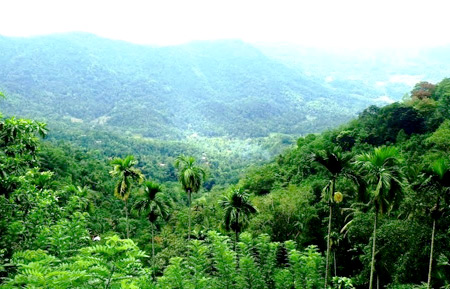From Thumpane to Timbuktu -Part 2
 Timbuktu
is a North African city that had thrived between the 17th and 18th
centuries but had turned deadly silent after that. What is the
connection between our Tumpane and distant Timbuktu? Simply that over
the years they assume a sort of wrong disguise by name, camouflaging the
actual past. Timbuktu
is a North African city that had thrived between the 17th and 18th
centuries but had turned deadly silent after that. What is the
connection between our Tumpane and distant Timbuktu? Simply that over
the years they assume a sort of wrong disguise by name, camouflaging the
actual past.
When one says, “Oh! Go to Timbuktu!” he or she actually visualises a
place full of fools. But Timbuktu actually presented a reverse picture.
Not that I was ever there but that does not prevent me from oozing over
it verbally. Really my source is an essay on this state which was also
called the City of Caravans that once flourished not only as a trade
centre that traversed and stood at the edge of the deserts, but further
as a centre of Islamic learning. Scribes of this state were never
decried but elevated as figures historical, magical and romantic.
According to a leading Timbaktuan, books were more desired here than
gold or slaves. Manuscripts in rich parchment form, that almost every
family owned and came down a passage of 400 years or more, are the proud
possession of many families. Most of the pages are now yellowing with
age but the delicate swirls of faded red and black ink on them, are said
to create beauties of their own. “At its peak” exults the writer, the
city boasted 50,000 residents and streets swollen with arriving camel
trains that stretched for miles.
Caravans
|

A scene from Thumpane |
The caravans are now no more. At one time it had been an entrepôt
that accumulated wealth by its very stand at the intersection of the
Saharan caravan routes and the Niger river.
Now not only has the city’s prosperity died and its learning
vanished, but it has also gained notoriety as a disparate collection of
terrorist cells, rebel groups and smuggling gangs that have exploited
Mali’s vast Northern desert. The sacred wafts of learning that encircled
it and now turned odious so much so that Western tourists are advised to
shirk the place. It is almost unimaginable the way a place can assume so
many guises within a number of years. At one time some people advised
others, “Oh. Go to Timbuktu” insinuating a confront with a city mired in
ignorance utterly disregarding the wealth of manuscripts it owned but
now the advice is not to go there at all because it is dangerous.
A French journalist has been killed and his body was never found.
Such isolated incidents can mar the reputation of a city or country.
Progress
Let us turn back to a more pleasant topic, that of the progress of a
city of a continent disparagingly called the Dark Continent, a
christening probably done by Westerners for the Easterners themselves.
Merchants had brought here cloth, spices and salt from places as far as
Granada, Cairo and Mecca to trade for gold, ivory and slaves from the
interior. With the hoarding of wealth, the city exhibited a spurt of
mosques that attracted scholars who in turn formed academies and
imported books from other Islamic countries.
Soon a love affair between books and Timbuktu just burgeoned and sad
to say, this love affair seems to have spelt its ruin. The army was
neglected more or less and when a Moroccan army descended on the city in
1591 its soldiers had looted the libraries and chased away the
academicians to the Morocco sultan. That had signalled the great
dispersal of Timbuktu libraries.
Evil befell the academic collections in the same way it happened here
when valuable documents were buried inside the mud walls, some retrieved
later by national minded academia as Dr. H.A.P. Abeywardena who busied
himself in the Kegalle district. In Timbuktu many documents were buried
in the desert or were lost in transit as camels and caravans carried
them along miles and miles of desert sand.
Later, much work was done to bring back the reputation of Timbuktu as
a centre of learning. But for some reason or other its reputation as a
dull and distant centre glued on to it.
Vessantara
I often wonder whether that mini-Vessantara has finished his book
unearthing the saga of Tumpane. The city after all had thrown up a
Sangharaja amidst the turbulent politics of the Nayakkar dynasty. Who
saw to it, so that he could rise to such heights? What libraries fed
him? But according to the the Bard’s lines that the evil that men do
lives after them while the good is buried with their bones, the
reputation of Thumpane as a city of fools has come to stay obliterating
its prestige as the home town of a great prelate.
That explains the coyness with which the retired Prisons Commissioner
admitted that he hails from Tumpane, when I congratulated him on his
noble act.
“But I am from Thumpane,” he almost lisped. Would somebody meeting a
Timbumyuan (Not impossible in those days of global travel) hail him as
an inheritor of a great tradition of learning got back this response
mildly express this sentiment; “But I am from Timbuktu, so far away and
so dark”.Names are nothing to go by. They are ephemeral. Only the
essence remains, that is the essence of learning and books. They are
magical and romantic and so soul-lifting. |

